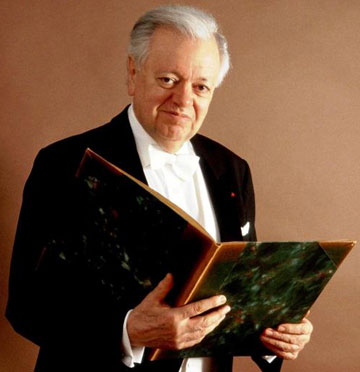Provincial Munich orchestra and Entremont’s uninspired leadership get Kravis classical season off to weak start

Phillippe Entremont and the Munich Symphony Orchestra opened the Kravis Center's Regional Arts series Tuesday night in West Palm Beach with music of Mozart and Schoenberg.
The Munich Symphony Orchestra opened the Regional Arts Concert Series at the Kravis Center in West Palm Beach on Tuesday night with a double bill of Mozart’s final, unfinished masterpiece and the first major work of Arnold Schoenberg. Kravis favorite Philippe Entremont, the orchestra’s laureate conductor, was on the podium.
This Munich ensemble should not be confused with the city’s other three excellent orchestras — the Bavarian Radio Symphony, Bavarian State Orchestra and Munich Philharmonic. The Munich Symphony is a third-tier orchestra of less than world class stature. Throughout the concert, persistent intonation problems and inconsistent execution marked orchestral playing that often sounded provincial.
Schoenberg’s Verklarte Nacht (Transfigured Night) was first conceived as a string sextet in 1899. Predating the composer’s historic break with tonality, the score is richly chromatic, expanding the heated romantic passion of Wagner’s Tristan and Isolde. Based on a poem about a woman’s confession to her lover about bearing another man’s child and the lover’s ultimate acceptance and forgiveness, Verklarte Nacht is a heady brew of richly inspired melodic and harmonic invention. Even in Schoenberg’s later version for full string orchestra, this score remains an artistic landmark from the twilight of musical romanticism.
From the score’s very opening bars, the Munich violins were often ragged, their intonation less than true. While viola and cello solos resounded with warmth and richness of tone, the concertmaster’s solo turn was thin and technically insecure. Entremont’s fast tempos robbed the score of much of its romantic ardor, confusing speed with passion. His square phrasing often reduced the music’s transcendent beauty to banality. Bereft of accumulated intensity, the final catharsis fell flat.
Mozart left his Requiem in D minor incomplete at his death. The final artistic product from the tumultuous year of 1791, the score was completed by Mozart’s pupil Franz Xavier Sussmayr. Sussmayr orchestrated most of Mozart’s existing manuscript, filled in several gaps in the score and apparently composed three of the four concluding movements for which there are no surviving sketches. While others have also produced completed versions of Mozart’s final musical will and testament, most notably Benjamin Britten and Boston musicologist Robert Levin, Sussmayr’s workmanlike edition is most often performed. Despite the score’s dual authorship, the Requiem is much more than an incomplete torso. Some of Mozart’s most spiritual, deeply moving music shines through its pages.
The Munich orchestra was joined by the superb Gloriae Dei Cantores, a forty-one voice choir based in Cape Cod, Massachusetts. Splendidly prepared by director Elizabeth Patterson, the choir produced full-voiced fortissimos that stormed the hall and the heavens but could also scale its sound down to the softest whisper. Benefitting from its compact size and corporate precision, the group brought total clarity to the fugal lines of the Kyrie. The women’s voices turned ethereal in the melodic glories of the Lacrimosa and the group’s mellow, beautifully blended sonorities in the Hostias marked the high point of a distinguished vocal performance.
The orchestral ensemble was not always in sync with the chorus. Wayward, thin toned woodwinds at the outset preceded some raucous brass playing, particularly in the score’s later pages. While the strings were more secure and played with greater tonal warmth than in the Schoenberg, there was a wild scramble in the violins at the onset of the Dies irae.
While the broad outlines of the Requiem were delineated, Entremont’s uninspired leadership and lackluster direction robbed the music of much of its eloquence. The heavy tread of the Rex tremendae and plodding tempo of the fugal Sanctus undercut the fine choral singing. In the solo quartet of the Benedictus, Entremont’s pace was too fast for the noble melody to take wing.
Russian-born soprano Valentina Fleer sang in richly colored, lyrical tones with a slight edge in her upper register. French mezzo Julie Cherrier’s light, attractive timbre was perfect for Mozart. Fleer and Cherrier blended felicitously in duets. Baritone Benjamin Bloomfield’s manly sound and strong low tones commanded the Tuba mirum, accompanied by a fine solo trombone. Only tenor Eric Barry’s effortful vocalism and strained high notes marred a strong solo quartet.
The Regional Arts Concert Series presents the Munich Symphony Orchestra with conductor-pianist Philippe Entremont in works by Mozart and Beethoven 2 p.m. Wednesday at the Kravis Center in West Palm Beach. 561-832-7469; kravis.org
Posted in Performances
Leave a Comment
Wed Nov 16, 2011
at 11:06 am
No Comments